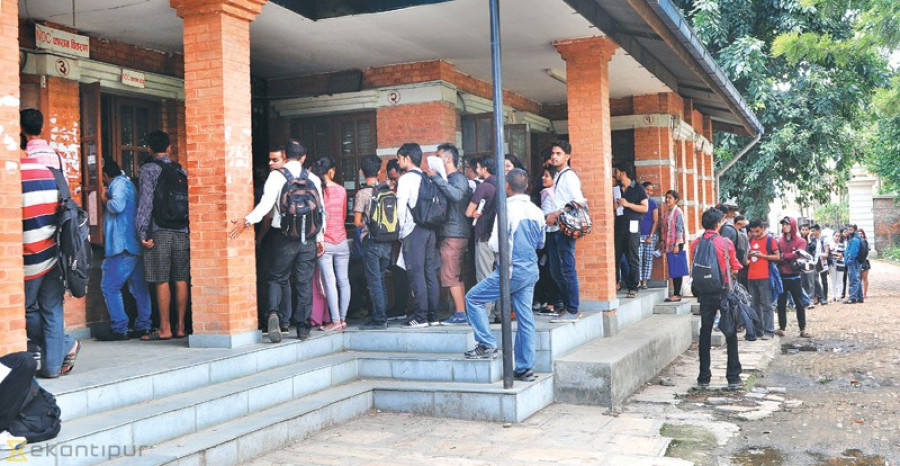Valley
Education ministry to stop issuing No Objection Letters for diploma and language courses
No letters will be issued unless students can provide an offer of higher education upon completing the diploma or language course
Binod Ghimire
The Ministry of Education, Science and Technology, starting Wednesday, will stop issuing ‘No Objection Letters’ to students who want to study only diploma or language courses abroad.
The decision was taken after increasing cases of Nepali diploma students facing problems abroad came to light, said Maheshwor Sharma, chief of the No Objection Certificate Management section at the Ministry of Education.
Furthermore, going abroad for diploma courses that last just a few months is against the existing legal provisions, said Sharma.
Clause 3(b) of the Scholarships Act of 1964, and its regulation issued in 2003, make it mandatory for students to acquire a ‘No Objection Letter’ before going abroad for studies.
The Act says, “No citizen of Nepal shall go abroad for higher studies without receiving no objection letter to be issued by the Ministry of Education.”
Diploma courses are generally non-university courses for students who have completed the tenth grade. And as grades 11 and 12 were incorporated into school-level education after the eighth amendment to the Education Act three years ago, only university-level education will now be considered higher education, said officials at the Education Ministry.
Though the amended Act came into effect in June 2016, students had been receiving no objection letters for diploma or language courses until Tuesday.
When asked why the regulation was not imposed immediately after the amendment to the Act, Sharma said, “We work as per directions. We are following directions from higher authorities.”
Letters, however, will be issued to students who can produce an offer letter that ensures admission to a university after the completion of their diploma course, said Sharma. Letters can also be issued in special cases, upon a recommendation from the foreign ministry or from the embassy of the destination country.
The Education Ministry took the decision after consulting with the Ministry of Foreign Affairs, following reports of diploma students and those studying language courses facing problems while pursuing higher education.
“The decision was taken after studying cases in Australia and other countries, where students in diploma courses suffered following the closure of their institutes,” said a senior official at the Foreign Ministry on condition of anonymity as he was not allowed to speak to the media.
Hundreds of students pursuing diploma courses were affected when two institutes under the Australia Institute of Business and Technology faced deregistration from the country’s regulator for vocational and training sector after they failed to meet the admission compliances. Though the decision to deregister AIBT-International has been revoked by the regulatory agency, the decision about AIBT, a separate school from AIBT-International, is still under consideration.
The number of Nepali students going abroad for higher studies has escalated in recent years. Records from the Ministry of Education show 16,504 students had acquired the No Objection Letter in the fiscal year 2013-14 while that number increased fivefold last fiscal year, with 62,800 students going for studies in 72 countries. Among them, some 32,200 students acquired the letter to study in Australia and 15,500 for Japan. Nepal is currently the third largest contributor of international students to Australia.
Representatives of education consultancies say that around half of all students opting to study in Australia take diploma courses while a majority going to Japan first enroll in language courses.
Kumar Karki, president of International Education Representative Initiative of Nepal, one of seven umbrella bodies of education consultancies, said that it was wrong to impose a complete ‘ban’ on studying diploma or language courses.
“There are good colleges in New Zealand, for example, that offer diploma courses,” he told the Post. The new decision, according to education consultancy operators, could lead to a sharp decline in the number of Nepali students travelling abroad.
Student guardians have also criticised the government’s decision, calling it immature. “It is wrong to have a blanket ban,” Suprabhat Bhandari, coordinator of the National Guardian Federation, told the Post.
The government should halt certification only for those institutes that have problems, said Bhandari. “It’s the duty of the government to ensure students don’t get into trouble in foreign lands, but that cannot stop students from enjoying their right to education of their choice,” he said.




 9.6°C Kathmandu
9.6°C Kathmandu














